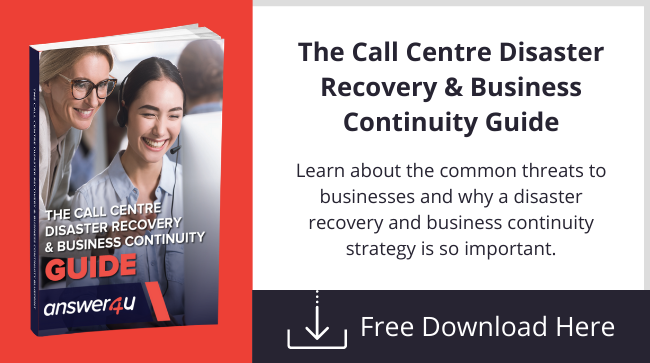
Networks are the vital arteries of today’s business, but they come with a range of vulnerabilities. As increasing numbers of businesses enter the digital era, awareness about potential problems - and how to respond to them – are starting to grow. Fortunately, implementing a robust network disaster recovery plan isn't as difficult as you might think. Here's seven common reasons for network disasters and how you can plan to avoid the disruption caused:
1. Phone Line Outage
It used to be power cuts that were responsible for many phone line outages, but as more businesses shift into cloud-based networking services, the risk of a server going down is also a threat. With this doubled risk, phone line outages now cost British businesses billions in wasted hours, missed leads, and backlogged orders each year.
One way of protecting your communications is to work with a telephone answering service. Providers can tailor a call-script to the unique requirements of your business, so that in the event of the phones going down no leads or sales are missed.
2. Hardware Failure
When you’ve tried switching it off and on again and the lights are still off, a time-consuming drama is likely to ensue. Fixing the problem can take days, even when experts are handling the crisis. For businesses, this means a frustrating and costly wait while potential clients and customers look elsewhere. Given that a consistent majority of all customer interactions still happen over the phone, a hardware failure can punch a particularly painful blow.
To avoid a hardware crisis, outsourcing your IT is a sensible option. Dedicated companies should be able to have you back up and running quickly. However, until they do, it is helpful to make use of a telephone answering service to ensure that no customer call is missed.
3. Local Environment Issues
Are you rural enough to be on a very long waiting list for fibreoptic broadband? Is your office being affected by noise from building works, traffic, or high winds? Are you trying to navigate calls while home-schooling?
These things may not bring the network to a complete standstill, but they can make communication challenging at best, and impossible at worst. The lost revenue is equalled by the frustration of not being able to provide the optimum level of customer service.
If your customers are handled by a professional answering service, they will have guaranteed call quality, regardless of environmental issues.
4. Hack Attack

Cyber-attacks have sky-rocketed since 2020. Businesses are learning to navigate the digital Wild West, but for now the criminals are running the show. Clothing giant Fat Face fell victim to a ransom attack, coughing up $2 million to a group known as the Conti Ransomware Syndicate. However, it’s not only the big names who are routinely targeted in hack attack schemes. According to UK insurance statistics, 40% of businesses experienced a cyber breach in 2020.
Arming your business with a disaster recovery call handling service is an excellent way of ensuring that attacks are more of an irritant than a crippling blow. If the worst does happen and your VoIP phone lines are affected, a dedicated call answering service can provide an extra layer of support by making sure that no leads are missed during the downtime.
5. Incompatible Changes
Many companies run bespoke or specialised software. Often, after a myriad of patches, software frequently struggles to adjust to necessary system updates, and sometimes simply stops working altogether. The fallout can be expensive in terms of downtime, and the sting in the tail is usually the requirement for hefty investment in new software, hardware, or both.
If your system does go down it’s not only a lengthy process to fix, it also takes time to adjust to the new application, during which important customer service and sales calls may be missed. To avoid lost revenue, it’s useful to have off-site telephone support to keep things running whilst the chaos is being fixed.
6. Old Equipment

It’s recommended that communications equipment is replaced every 3-5 years. However, everybody who’s set foot in an office knows that it doesn’t always play out like that. Even if your workplace isn’t running off a limping Commodore, it’s likely that you’re not blazing away with the latest Intel core either. Even the most reliable of workhorses will collapse eventually, and communications networks have a way of timing this to coincide with dates such as product launches, seasonal uplifts, and marketing campaigns.
If your network is older than three years, make sure that part of your disaster recovery plan includes a call answering service, as this will keep your business moving even if your screens are silent.
7. Human Error
Often described as a ‘cascade’ or ‘chain effect’, a mistake in one area can have an impact on a host of associated network devices such as firewalls, routers, and switches. The problem doesn’t always originate in the office, either. An engineering mishap, such as a mistyped IP, incorrect filter list, or inaccurate coding can have a devastating ripple effect on your phone service, even if it happens hundreds of miles away.
Human error is responsible for up to 70% of cloud-based telecoms network failures, and those statistics mean that the likelihood of your organisation being affected is high. When making your network disaster recovery plan, ensure that there is a professional call management service on hand for the day that the system goes down.
What Next?
At Answer4u, we understand the importance of keeping the phone lines open even in the midst of a network disaster.
To start making proactive enhancements to your recovery plan, have a chat with one of
our telecom specialists today.
0808 169 5808

Categories
- 24 Hour Call Answering Service (7)
- After Hours Call Answering (5)
- After-Hours Call Answering Service (6)
- Answer-4u (18)
- Artificial Intelligence (5)
- BPO (5)
- Business (67)
- Business Grants (3)
- Business Growth (4)
- Business Owner (6)
- Business Strategy (3)
- Call Diversion (6)
- Call Handling Service (13)
- Charity (2)
- Christmas (6)
- Customer Experience (5)
- Customer Satisfaction (3)
- Customer Service (32)
- Customer Services (8)
- Decision Making (3)
- Diary Management (3)
- Digital Marketing (16)
- Disaster Recovery (5)
- EntrepPhase (7)
- Entrepreneurs (7)
- Finance (2)
- Funding (3)
- HR (6)
- Infographic (2)
- Inspiration (2)
- Leadership (4)
- Marketing (15)
- Marketing Strategy (2)
- Networking (2)
- Other (4)
- Outsourcing (17)
- Phone Etiquette (11)
- Productivity (6)
- Property Management (3)
- Recruitment (7)
- ROI (1)
- Self Improvement (2)
- Small Business (14)
- SME (4)
- Staff Training (2)
- Start-Up (10)
- Technology (3)
- Telephone Answering (14)
- Time Management (4)
- Virtual Assistant (3)
- Virtual Receptionist (14)
- Workforce (9)
- Working Environment (9)
- Workplace (29)




